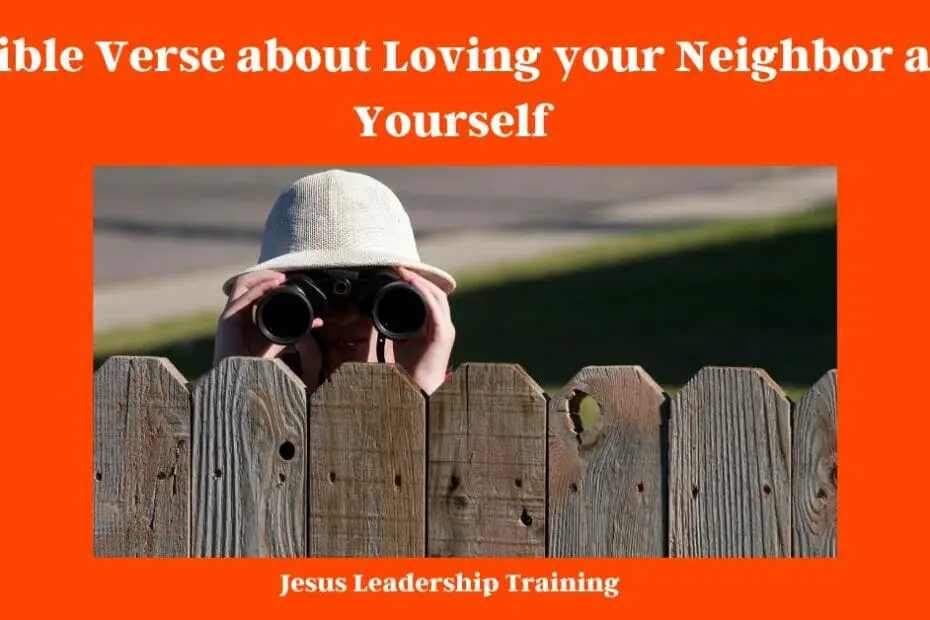Bible Verse about Loving Your Neighbor as Yourself – One of the most important commandments in the Bible is to love your neighbor as yourself. This commandment is found in both the Old and New Testament,( Lev 19:18), (Mark 12:31) and it is reiterated by Jesus himself. It is a simple concept, but it can be difficult to put into practice. In this blog post, we will discuss what it means to love your neighbor as yourself and how you can apply this principle to your own life.
Table of Contents
Bible Verse about Loving your Neighbor as Yourself
]The Bible verse that instructs us to love our neighbors can be found in several places in the Scripture 📖. Here are a few places where this profound teaching of loving one’s neighbor is highlighted:
- Leviticus 19:18 (NIV) 🌿
“‘Do not seek revenge or bear a grudge against anyone among your people, but love your neighbor as yourself. I am the LORD.”
- Matthew 22:39 (NIV) 💙
Jesus said, “And the second is like it: ‘Love your neighbor as yourself.’”
- Mark 12:31 (NIV) 💖
“The second is this: ‘Love your neighbor as yourself.’ There is no commandment greater than these.”
- Romans 13:9 (NIV) ❤️
“The commandments, ‘You shall not commit adultery,’ ‘You shall not murder,’ ‘You shall not steal,’ ‘You shall not covet,’ and whatever other command there may be, are summed up in this one command: ‘Love your neighbor as yourself.’”
- Galatians 5:14 (NIV) 🌺
“For the entire law is fulfilled in keeping this one command: ‘Love your neighbor as yourself.’”
- James 2:8 (NIV) 🌟
“If you really keep the royal law found in Scripture, ‘Love your neighbor as yourself,’ you are doing right.”
Remember, loving your neighbor implies showing kindness, respect, and goodwill towards others, irrespective of their backgrounds or beliefs, reflecting the boundless love God has for each one of us. Keep spreading love and kindness! 💕
Love your neighbor as yourself.” This simple Bible verse (First Commandment, the Great Commandment) from Leviticus 19:18 is one of the most well-known and beloved passages in Scripture. And yet, it is also one of the most challenging to put into practice.
To love our neighbor as ourselves, we must first learn to love ourselves. We must see ourselves as God sees us – precious and beloved children. Only then can we begin to see others in the same way. When we love our neighbor as ourselves, we treat them with kindness and compassion, always seeking their best interests.
We forgive them when they sin against us, just as we ask for forgiveness when we sin against them. And above all, we develop a deep respect for their God-given dignity and worth. By loving our neighbor as ourselves, we can help create a world that is more just, peaceful, and compassionate.
Who is our Neighbor in the Old Testament? (Neighbor Bible Verses)

The word “neighbor” can have different meanings depending on the context in which it is used. In the Old Testament, the word “neighbor” is used in several different ways. Let’s take a look at some of those uses and what they mean for us today.

Friend – 2 Sam 13:3
The first use of the word “neighbor” that we see is in the context of friendship. In 2 Samuel 13:3, we see that David had a friend named Jonathan who was also the son of Saul. Even though Saul was David’s enemy, Jonathan was still his friend. This shows us that our neighbors can be people who are different from us, but that doesn’t mean we can’t be friends with them.
Rival – 1 Sam 28:17
The second use of the word “neighbor” is in the context of rivalry. In 1 Samuel 28:17, we see that Saul was jealous of David because he was becoming more popular than Saul himself. This shows us that our neighbors can be people who are competition for us, but we don’t have to let that rivalry turn into hatred or bitterness.
Lover – Jer 3:1
The third use of the word “neighbor” is in the context of love. In Jeremiah 3:1, we see that God loved Israel even though they had turned away from Him and were worshiping other gods. This shows us that our neighbors can be people who make mistakes, and we can still love them even when they do.
Spouse – Jer 3:20
The fourth and final use of the word “neighbor” that we see is in the context of marriage. In Jeremiah 3:20, we see that God says He wants to marry Israel even though they have been unfaithful to Him. This shows us that our neighbors can be people who disappoint us, but we can still forgive them and have hope for a better future together.
These are just four of the many ways that the word “neighbor” is used in the Old Testament. No matter who our neighbor is, we are called to love them as ourselves (Mark 12:31). We are called to be friends with those who are different from us (2 Cor 5:18-19). We are called to forgive those who make mistakes (Luke 17:3-4). And we are called to hope for a better future for those who disappoint us (Rom 5:5). Who is your neighbor? How will you love them today?

Jesus and the New Testament Neighbor
In the New Testament, Jesus was asked by a lawyer, “Who is my neighbor?” (Luke 10:29). The lawyer was testing Jesus, but Jesus graciously answered his question.
It is called the:
- Royal Law
- Whole Law
- Fulfilling of the Law
- New Commandment
- Second Commandment
- Covers a Multitude of Sins
- Fulfillment of the Law
- Greater Love
- Perfect Love
- Golden Rule
- Divine Love
- Neighbor Love

First, Jesus quoted from Leviticus 19:18, “You shall love your neighbor as yourself.” But then He expanded on this commandment in three ways.
1. Loving our neighbor includes everyone—even our enemies.
In Luke 6:27-28, Jesus said, “But I say to you who hear, love your enemies, do good to those who hate you, bless those who curse you, pray for those who abuse you.” This is a hard commandment to obey, but it is what God calls us to do. Why? Because He loves His enemies (Romans 5:8). When we love our enemies, we are reflecting the character of God. It shows that we have been changed by the Gospel and that we are living for something bigger than ourselves.
2. Loving our neighbor means doing good deeds for them—not just talking about it.
In James 2:14-17, we read, “What good is it, my brothers, if someone says he has faith but does not have works? Can that faith save him? If a brother or sister is poorly clothed and lacking in daily food, and one of you says to them, ‘Go in peace, be warmed and filled,’ without giving them the things needed for the body, what good is that? So also faith by itself, if it does not have works, is dead.” Merely saying that we love our neighbor is not enough—we must back up our words with actions. If we see someone in need and do nothing to help them, our faith is dead. But when we put our faith into action by helping those in need, it shows that we truly love our neighbors as ourselves.
3. Loving our neighbor means sharing the Gospel with them—because it is the best news they will ever hear!
In Matthew 28:19-20a, Jesus said, “Go therefore and make disciples of all nations…teaching them to observe all that I have commanded you…” Why did Jesus command us to share the Gospel with others? Because He wants everyone to hear the good news about His death and resurrection so that they can be forgiven of their sins and have eternal life! When we share the Gospel with others out of love for them, we are obeying Jesus’ commandment to love our neighbors as ourselves.

7 practical ways to love our neighbors as ourselves
The Bible tells us to love our neighbors as ourselves, but what does that practically look like? Here are 7 ways we can practically love others the way God intended.
1. Get to know them. One of the best ways to love others is simply by getting to know them. We can’t love someone we don’t know, so take the time to learn about the people around you. Ask them about their day, their hobbies, their families, etc. The more you know about someone, the easier it will be to love them.
2. Be patient with them. Everyone has different triggers and buttons, so it’s important to be patient with those around us. If someone gets under our skin, it’s probably because we don’t really know them that well yet. So instead of getting upset, try to be patient and understand where they’re coming from. Chances are, they’re just trying to figure things out like the rest of us.
3. Speak kindly to them. It’s so important to speak kindly to those around us, even if we don’t always feel like it. Words have power, and we should use that power to build others up instead of tearing them down. A kind word can go a long way in making someone feel loved and appreciated.
4. Give them the benefit of the doubt. It’s easy to assume the worst about people, but we should always try to give them the benefit of the doubt. Everyone makes mistakes, and we should be quick to forgive instead of quick to judge. If we can give others grace, chances are they’ll be more likely to do the same for us when we need it most.
5. Encourage them in their gifts and talents. We all have gifts and talents that make us special and unique, so one of the best ways to love others is by encouraging them in those areas. If someone you know is good at something, tell them! Compliment their abilities and let them know how much you appreciate what they bring to the table. We all need a little encouragement from time to time, so why not be the one who provides it?
6. Pray for them regularly . . . One of the best things we can do for others is pray for them regularly. Prayer is powerful, and God hears our every word. So when we take the time to lift others up in prayer, we’re doing something truly special for them . . . even if they never know it!
7. Serve them selflessly… Another great way to love our neighbors is by serving them selflessly.. We live in a world that’s all about “me,” but true love is all about giving without expecting anything in return.. When we serve others without any ulterior motives, it shows that we truly care about their well-being.. And that’s something everyone can appreciate!

Final Thoughts – Bible Verse about Loving Your Neighbor as Yourself
Who is your neighbor? According to Jesus Christ Himself, anyone and everyone—even our enemies! We are called to love our neighbors(in humility value others) by doing good deeds for them and sharing the Gospel with them so that they can hear about God’s amazing plan of salvation. Let us follow Jesus’ example of compassion and mercy as we go out into the world each day obeying His commandment of Christ to love others! Knowing God is the source of all love and as children of God sharing that kind of love.
We can show it to:
- Tax Collector
- Church Members
- A Family Member
- Little Children
- Those we are in conflict with
- Showing a Better way
God Bless Greg




